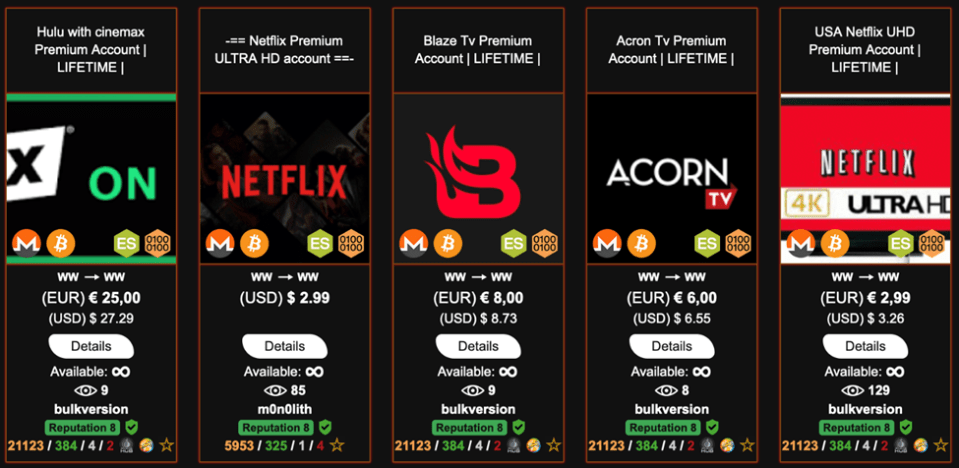Inside dark web TV market where stolen Netflix and Amazon logins go for £4 – sinister text means you’re the next target
Users of Prime Video and NETFLIX have been alerted that they are the victim of an almost continual barrage of scammers attempting to access their accounts.
The dark web is seeing a boom in the selling of stolen streaming accounts, according to a recent analysis from cybersecurity specialists Bitdefender.
The team claims that cybercriminals are imitating trustworthy retail websites.
They include customer ratings, bulk discounts, and even “warranties” on listings of stolen streaming accounts that are for sale for $5 to $15 (4–12).
The director of Bitdefender’s Threat Research and Reporting section, Bogdan Botezatu, told The Sun that “many subscription plans offer ‘lifetime guarantees’.” “Meaning customers are able to order the subscription as a one-time purchase which lasts ‘for life’.”
He continued: “While the validity of this claim is difficult to measure, it can be tracked through consumers reviews of the product.”
READ MORE ON STREAMING
Crooks most likely “get their hands on fresh accounts at a constant rate,” according to Botezatu, in order to follow claims of “lifelong” memberships and warranties.
Fraudsters accomplish this by either establishing new accounts using the payment information from credit cards that have been stolen or by phishing clients and taking over accounts for dark web purchasers.
“Cybercriminals can create fresh accounts and add stolen or fraudulent payment mechanisms such as credit cards or gift cards for services that support this type of payment,” Botezatu said.
“The goal of certain such fraudulent schemes is to obtain money from victims via gift cards.
“These companies frequently exchange gift card balances for a small portion of their cryptocurrency value.
“Those who buy gift card money can then pass this ‘value’ down as streaming accounts to customers.”
Dark web revealed – how the internet’s shadowy twin fuels cybercrime and empowers digital privacy
Netflix subscribers were alerted by Bitdefender just last week about a bank-raiding fraud that might compromise their accounts and credit card details.
Consumers receive suspicious SMS messages with phony links to Netflix.
The messages state that the recipient has not paid for their membership and that if they do not pay the remaining amount, their account will be suspended.
They are then sent to a phony Netflix page via the link, which gives thieves access to their payment and login credentials.
The reviews that sellers get are quite important to them.
According to the Bitdefender-provided listings in the above image, sellers have an 8 reputation rating, which indicates that customers are satisfied with their purchases.
Read More on The US Sun
Popular seller ‘bulkversion’ has sold tens of thousands of ‘lifetime’ Netflix memberships, indicating that an even greater number of users have been defrauded of their credentials.
The two most popular platforms on the dark web are Netflix and Prime Video, although other US services like Hulu and Blaze TV are also well-liked.
What is the dark web?
The surface web, deep web, and black web are the three layers that truly make up the internet.
The Sun website that you are currently viewing is an example of the top layer, or surface web, which is made up of websites that appear through search engines like Google.
Search engines are unable to reach the web pages that make up the deep web.
These are sites that are hidden or that require authorization and passwords to visit.
Deep web content that isn’t visible to search engines is accessed whenever you connect into an account.
This implies that your banking details or Amazon wishlist won’t appear in the results if someone were to Google your name.
The black web, on the other hand, is a network of websites and online activity that cannot be tracked.
You need to utilize specific software, setups, or authorization to access them, and search engines cannot find them.
Neither the US nor the UK have laws against the dark web.
This is due in part to the fact that, despite frequently containing illegal content, the dark web isn’t always harmful.
However, it is challenging to monitor who is using the dark web and prevent access.
Therefore, it might not be morally or legally acceptable to completely ban the dark web.
Note: Every piece of content is rigorously reviewed by our team of experienced writers and editors to ensure its accuracy. Our writers use credible sources and adhere to strict fact-checking protocols to verify all claims and data before publication. If an error is identified, we promptly correct it and strive for transparency in all updates, feel free to reach out to us via email. We appreciate your trust and support!















